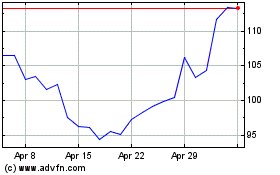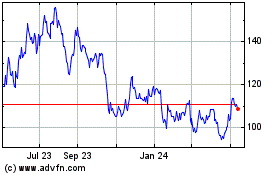China Targets Online Advertising with New Regulations
July 08 2016 - 9:20AM
Dow Jones News
BEIJING—New regulations on online advertising are targeting a
wide-range of practices from email to videos, affecting businesses
from e-commerce to social media, as China's government tries to get
a hold of a fast-moving segment of the internet.
The rules, issued Friday by the State Administration for
Industry and Commerce, are China's most comprehensive to date,
broadly defining online and electronic advertising as including
email ads, paid search results, embedded links, images or videos
"with the purpose of promoting goods or services."
The regulations, which take effect in September, lay out
guidelines against false or misleading practices and prohibit
online ads for prescription medication and tobacco while requiring
prior government approval for ads for medical supplies, pesticides,
veterinary medicine and other health products.
"Before this, there was no law that defined exactly what an
internet ad was and the regulations were a bit piecemeal," said
Eugene Low, a partner at the Hong Kong office of law firm Hogan
Lovells.
Though drafted last July, the regulations come amid quickened
efforts to regulate online advertising practices following the
public uproar over the death in April of a college student with a
rare form cancer. The student died after trying a treatment he
found advertised on Chinese internet search giant Baidu Inc.'s
platform. The ensuing criticism took aim at the murky online
environment for health information.
Included in the new regulations is a requirement that all paid
advertising be clearly identified in search results—a policy issued
by China's internet regulator last month in the immediate aftermath
of the student's death. Regulators in the weeks since the student's
death have also required that Baidu and other search companies
limit ad results to 30% of each search-results page.
The stakes are high, as China's huge online population provides
a lucrative and growing market for advertising. Research firm
eMarketer predicts digital ad spending will reach $40.4 billion in
China this year, up from $24 billion two years ago.
With such a broad definition of online advertising, the new
rules will affect search, e-commerce and social-networking sites,
where paid ads and marketing emails are generally accepted
practices, advertising experts said. Alibaba Group Holding Ltd.'s
Taobao Marketplace, for example, will likely fall under the
regulations, along with sites like internet portal Sohu.com and
58.com, a Craiglist-like site in China.
Alibaba said it had taken notice of the new policies and is
reviewing them. Sohu.com declined to comment and 58.com didn't
immediately respond to a request for comment.
Some analysts said the regulations were overdue given the rapid
evolution of internet business, though they questioned whether the
rules might be overly broad. "Consumers will have a much cleaner
environment on the internet now," said Tian Hou, founder of
research and advisory firm T.H. Capital. She said that policies
regarding email ads seemed "a bit overdone."
Ms. Hou said the new policies most likely won't diminish
businesses' bottom lines because pay-for-click ads often run on a
bidding system for a limited amount of space. Other analysts,
however, said taxes for businesses may increase because the new
rules clearly define paid search results as advertisements.
In a question-and-answer statement posted on the website of the
regulator, the official in charge of advertising practices said the
rules were important because "illegal activities happen again and
again and demand specific measures."
The official, Zhang Guohua, added that the laws will be revised
as the industry develops. The laws apply to all forms of platforms,
he said, including, for example, individuals on social media site
Weibo who have many followers and may release a promotion on their
own individual feed.
Liyan Qi and Fanfan Wang contributed to this article
Write to Alyssa Abkowitz at alyssa.abkowitz@wsj.com
(END) Dow Jones Newswires
July 08, 2016 09:05 ET (13:05 GMT)
Copyright (c) 2016 Dow Jones & Company, Inc.
Baidu (NASDAQ:BIDU)
Historical Stock Chart
From Mar 2024 to Apr 2024

Baidu (NASDAQ:BIDU)
Historical Stock Chart
From Apr 2023 to Apr 2024
